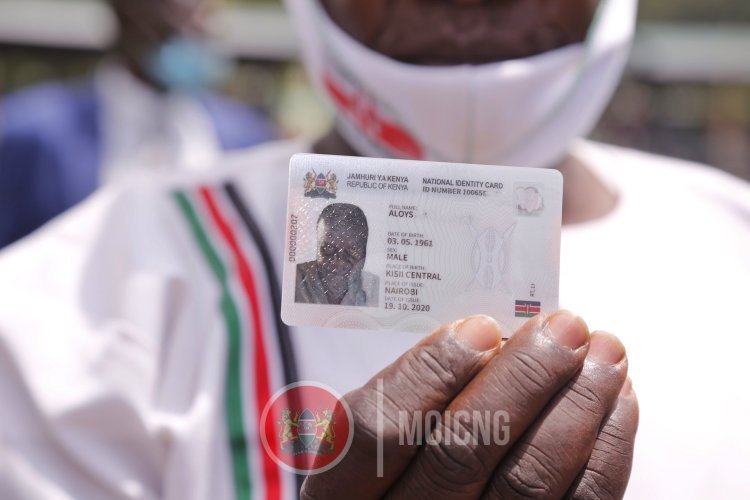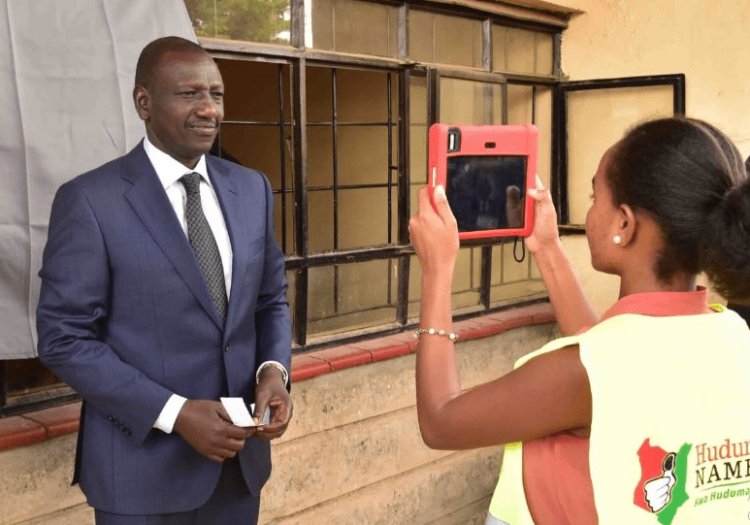Maisha Namba: Details Of Digital Identity Set To Replace Huduma Namba
Immigration Principal Secretary (PS) Julius Bitok revealed that the new digital identity system will be referred to as Maisha Namba.

The Kenyan government on Monday, August 14 gave a new name to the Unique Personal Identifier (UPI) whose rollout is scheduled to commence on October 2, 2023.
Immigration Principal Secretary (PS) Julius Bitok revealed that the new digital identity system will be referred to as Maisha Namba.
Bitok made the announcement during the signing of a memorandum of understanding between the Kenyan government and the United Nations Development Programme (UNDP).
Maisha Namba is the official name given to the proposed UPI which will be a key part of the new digital identity proposed by the government.

Immigration and Citizen Services PS Julius Bitok during the signing of a memorandum of understanding between the Ministry of Interior and National Administration and the United Nations Development Programme(UNDP) in Nairobi on August 14, 2023. /FACEBOOK.JULIUS BITOK
"The digital identity system will provide Kenyans with a secure and reliable way to verify their identity for a variety of purposes, including accessing government services, opening bank accounts, and travelling. It will also help to reduce fraud and corruption and improve efficiency in government services.
"During the signing of a Memorandum of Understanding (MOU) between the Ministry of Interior and National Administration and the United Nations Development Programme(UNDP) for partnerships in the implementation of Digital Identity in Kenya," stated Bitok.
During the rollout, all Kenyans will be assigned a Maisha Namba which will be a unique personal identifier. The new system will thus see all Kenyans assigned Unique Personal Identification (UPI) numbers at birth.
The UPI will be uploaded in the eCitizen portal and will give all newborns a unique number to be used in schools and colleges as well as be used by the National Health Insurance Fund (NHIF), and Kenya Revenue Authority (KRA) as a means of identifying all Kenyans.
The government has also embarked on upgrading the current automated fingerprint identification system (AFIS) into an automated biometric identification system, set to bolster security measures and make it increasingly difficult for individuals to engage in identity-related crimes.
In addition to reinforcing security features, the upgraded IDs will offer a range of new capabilities, including online authentication using shortcodes.
This innovation will enable individuals to authenticate their identification cards conveniently and securely through online platforms, enhancing accessibility and minimizing the need for physical verification.
The project bears some similarity to the Huduma Namba project which spectacularly failed under former President Uhuru Kenyatta, and is aiming to connect various individual databases to facilitate effortless access to a comprehensive array of government services.
ICT Cabinet Secretary Eliud Owalo on Monday, July 31 disclosed that Kenyans will no longer be mandated to acquire the digital identity card, a reverse from the directive issued by the previous government.
Owalo argued that it is not the role of the government to force people to register for the card, instead the decision should rest on the Kenyans to decide whether they want the cards or not, in a move to encourage compliance.
“We will not force any Kenyan to take a digital identity. The honours will be in you to decide whether you want to consume govt services through digital identity based on your biodata or you want to physically visit govt offices,” Owalo noted.
"We need virtual means through which the government can confirm you are who you claim to be. It will be upon you now to decide whether you want to take it."
A section of Kenyans had expressed their reservations with the plan, believing that the new cards could be issued with current numbers without the need of overhauling the whole system.
On Friday, June 30, President William Ruto revisited the Huduma Namba project which stalled under former President Uhuru Kenyatta, lamenting that it cost the previous regime Ksh15 billion.
“In the next 90 days, we must have a digital ID. That digital id has been traumatic for Kenya. We are all aware that there was another phantom project called huduma namba, that huduma namba was a complete fraud because we lost almost Ksh 15 billion and got very little out of it,” said Ruto during the unveiling of digital government services at the Kenyatta International Convention Centre (KICC) in Nairobi.
Accordingly, Ruto urged government officials to show in three months that a digital ID project can work without wasting Ksh15 billion from public coffers, calling out those responsible for the failure of Huduma Namba.


 admin
admin 




